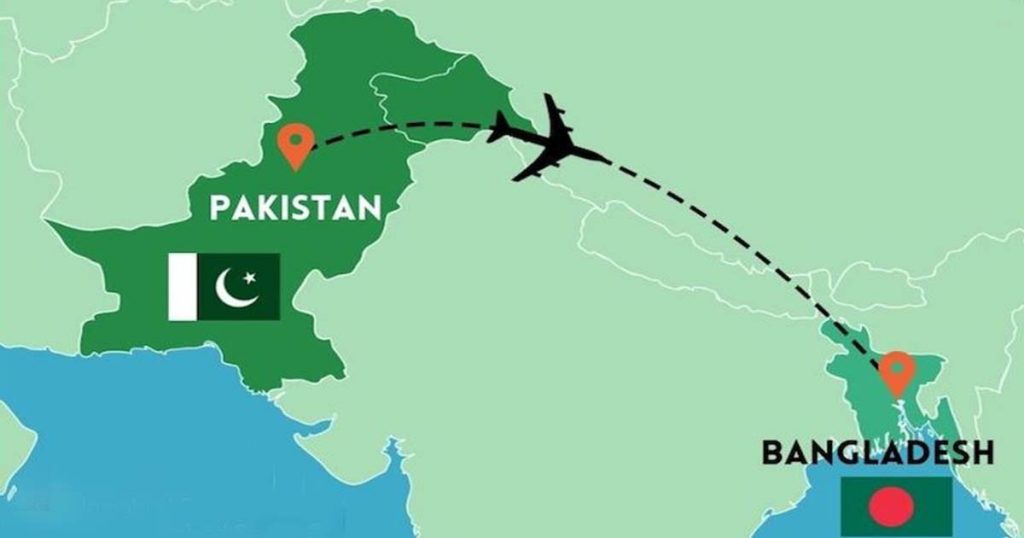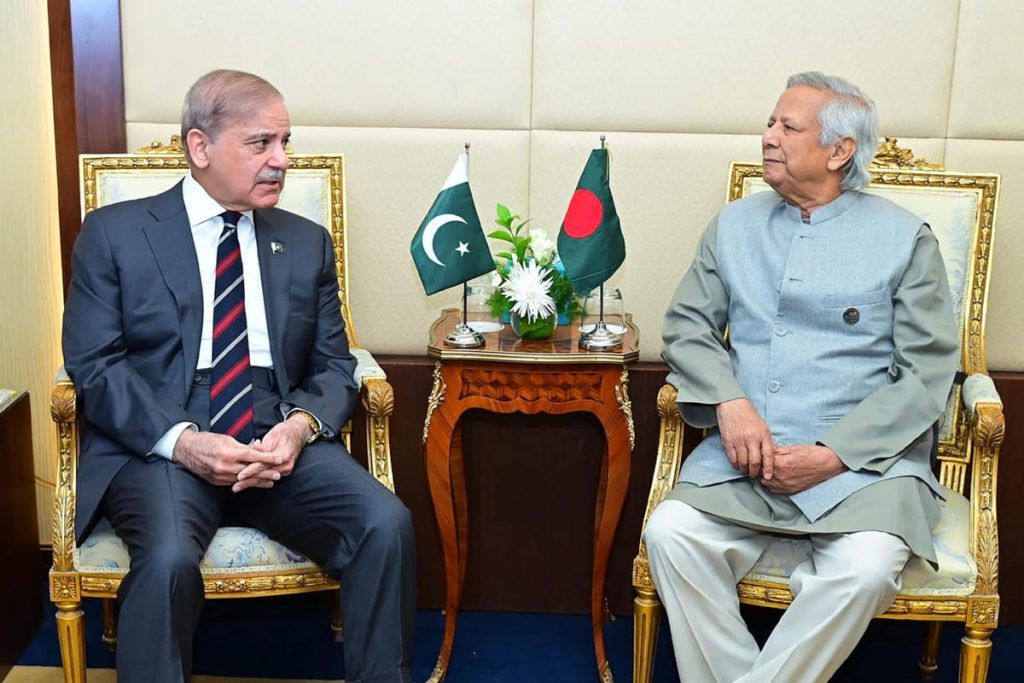Pakistan has expressed a clear desire to strengthen its ties with Bangladesh and deepen trade and cooperation across sectors.
While diplomatic ties experienced strain, economic interaction never fully ceased, though it operated far below capacity.
Pakistan and Bangladesh are entering a new phase of engagement, driven by mutual interest in peace, economic progress, and regional cooperation. Despite decades of strained relations rooted in historical sensitivities, both countries today appear increasingly eager to turn the page and forge a more constructive partnership. Pakistan has expressed a clear desire to strengthen its ties with Bangladesh and deepen trade and cooperation across sectors.
The resumption of direct trade in early 2025, marked by the first shipment of Pakistani rice to Chattogram in over half a century, signaled more than just economic exchange. It marked a renewed willingness to move past historical discomforts and focus on shared opportunities. Historical grievances between Pakistan and Bangladesh, such as unresolved issues around assets or calls for formal apologies, remain a sensitive part of the bilateral relationship. While acknowledging these sensitivities exist, the experience of functional cooperation in Europe offers a powerful lesson

Deep economic interdependence and shared prosperity create the most conducive environment for resolving intractable political and historical issues.
Lingering mistrust rooted in past events continues to shape public perceptions, but this distance can be narrowed through focused short and long-term strategies that both countries need to adopt. By shifting the focus to mutual gains, such as trade, joint ventures, and people-to-people exchanges, can build trust, promote a shared stake in the future, and create the conditions to address historical grievances through cooperation rather than confrontation
While diplomatic ties experienced strain, economic interaction never fully ceased, though it operated far below capacity. Current annual bilateral trade hovers around US$ 824 million, a figure starkly disproportionate to the combined market size of nearly 400 million people. Pakistan exports to Bangladesh reached US $778 million in FY-24, dominated by cotton (US $593.94 million), salt, sulphur, and cement-based products ($53.43 million), inorganic chemicals (US $30.17 million), and sugars (US $12.06 million). Conversely, Bangladesh exports to Pakistan have dwindled significantly, plummeting to just US $46 million in FY-24 from over US $90 million in 2021(Source: ITC Trade Map Data), primarily comprising jute, raw tobacco, and textile fibres. This glaring trade imbalance highlights both a challenge and an opportunity.
While textiles continue to anchor the trade relationship, a host of high-potential sectors offer promising avenues for future cooperation. In pharmaceuticals, Bangladesh maintains double-digit growth in generic production. Pakistan, with its capabilities in Active Pharmaceutical Ingredient (API) production and regional market access, could become a valuable partner through joint ventures and harmonized regulations. In the construction sector, Bangladesh projected US $46 billion market by 2030 and the need to upgrade over 40 cement plants present openings for Pakistani exports of plant machinery, cement technology, and technical consultancy.

As a densely populated country with growing urban centers, Bangladesh faces increasing demand for improved road networks, overhead bridges, and efficient transportation systems. This presents a significant opportunity for Pakistani firms, particularly engineers, architects, and construction companies, to contribute their expertise. Over the years, Pakistan has developed considerable experience in building motorways, highways, and metro bus and train systems that meet international standards. These capabilities position Pakistan as a valuable partner in supporting Bangladesh’s efforts to modernize and expand its road, rail, and broader infrastructure landscape.
The IT and tech services sector is equally promising, with Bangladesh digital ambitions complemented by Pakistan strengths in software development, financial technology (fintech), and business process outsourcing (BPO). Joint ventures and structured skills exchange programs can drive regional digital growth. In light engineering, Pakistan capacity to manufacture automotive and agricultural machinery components aligns well with Bangladesh rising domestic demand. Likewise, agricultural technology collaboration particularly in irrigation systems and high-yield crops can support Bangladesh food security goals, offering room for tech transfers and training initiatives.
As part of a short-term strategy, both countries must act swiftly and decisively to seize the opportunity. In the short term, trade facilitation should be prioritized. Establishing direct banking channels and exploring rupee-taka currency swaps, while activating already-announced direct cargo flights and shipping routes would ease logistics. Organizing sector-specific trade fairs, such as a Pakistan-Bangladesh Pharma and Med Tech Expo in Dhaka or a Construction Materials Summit in Karachi, could promote targeted B2B matchmaking.
Focused government-business delegations with commercial agendas should replace symbolic visits, helping firms explore market entry and joint ventures. A Pakistani delegation of cement and engineering executives to Dhaka or Bangladeshi IT and pharma professionals touring Pakistani tech parks could open concrete channels for cooperation. Moreover, a joint technical committee should be formed to identify and swiftly remove non-tariff barriers (NTBs) that continue to hinder existing trade.
As part of a long-term strategy to move beyond transactional exchanges, both countries must prioritize structured collaboration and confidence-building to achieve lasting economic integration

Leverage frameworks to systematically reduce tariffs and create a predictable investment climate, aiming for the US $3 billion bilateral trade target within 3 years. To drive this vision, both sides must actively promote joint ventures in key sectors such as API plants, IT parks, cement modernization, and light engineering. A dedicated Pakistan-Bangladesh Joint Venture Facilitation Desk could help remove red tape and guide investors. In parallel, soft power and human connections must be cultivated. Scholarship programs for students and academics in the field of medical, engineering, business and textile as well as joint research in climate and renewable energy, and cultural festivals can build familiarity and trust, much like the European Union early model of functional cooperation.
Tourism and connectivity are also ripe for development. Simplifying visa procedures, promoting joint historical tourism circuits, and exploring affordable travel options, could deepen people-to-people contact. Crucially, the long-dormant Pakistan-Bangladesh Joint Economic Commission (JEC) should be revived at the ministerial level to oversee this vision and provide structured dialogue for resolving issues.

Pakistan and Bangladesh face common existential challenges: climate change, economic volatility, and the need to empower their large youth populations. Prolonged estrangement comes at a heavy cost, in lost jobs and unrealized growth. The path forward demands courageous leadership that places the welfare of people above the burdens of history. By leveraging economic complementarities and deepening integration in sectors like textiles, pharma, tech, and engineering, both nations can transform their relationship into one defined not by the past but by a shared vision for South Asia future.
These opportunities emerge at a time when high-level official delegations, including heads of state, are engaged in mutual visits, as these visit essential to support the initiatives to ensure they will set a constructive tone for deeper collaboration. The recent resumption of trade offers a hopeful beginning. It must now become the spark that lights the way toward a new era of partnership, one built on trust, opportunity, and shared prosperity. The potential rewards, stability, economic growth, and regional strength, far outweigh any unresolved claim. The moment for decisive, visionary action is not in the distant future. It is now.

